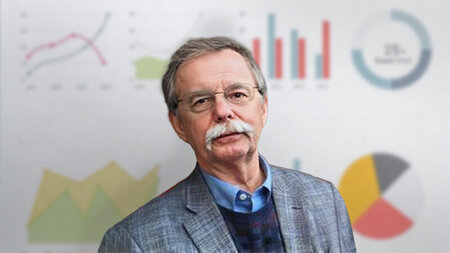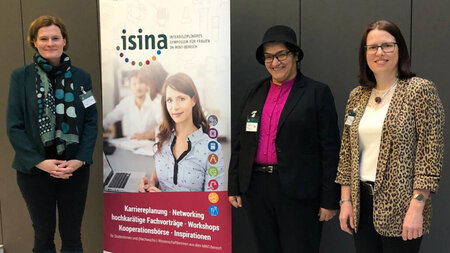Welcome to the Chair of Economics!
The primary research pursuits of the Chair center on investigating the function of climate-related financial policies in establishing a stable financial system and achieving a shift toward a low-carbon economy. In light of the COVID-19 pandemic, our current research investigates the trade-offs among virus containment policies, economic performance, financial stability, and the combined consequences of climate risks and the outburst and spread of an epidemic on the financial sector. Please refer to our research page for further details.
The teaching activities of the Chair focus on the macroeconomic implications of climate risks, climate and sustainable finance, and agent-based computational macroeconomics.
News
04.04.2024 New Publication in Journal of Sustainable Finance and Investment
Jun-Prof. D'Orazio latest research "No need to worry? Estimating the exposure of the German banking sector to climate-related transition risks" - jointly with Dr. Tobias Hertel and Fynn Kasbrink - is published in the Journal of Sustainable Finance & Investment. Using data on financial firms' exposure to nonfinancial companies from the Deutsche Bundesbank, the analysis evaluates the German banking sector's vulnerability to climate-related transition risks. The paper is available open-access at this link.01.03.2024 New Publication in Applied Energy
The research "Exploring the interdependence of climate, finance, energy, and geopolitics: A conceptual framework for systemic risks amidst multiple crises" conducted by JunProf. D'Orazio with Dr. Franziska M. Hoffart, Prof. Franziska Holz, and Prof. Claudia Kemfert has been published in the scientific journal Applied Energy. The paper provides a groundbreaking conceptual framework to analyze the dynamic interplay between climate change, financial stability, and geopolitical crises affecting energy transitions. The paper is available open-access at this link.26.03.2024 Invited speaker at the Financial Stability Conference organised by the Magyar Nemzeti Bank
On March 26th, JunProf D'Orazio is scheduled to deliver a speech at the Financial Stability Conference organized by the Magyar Nemzeti Bank. The speech, titled "Systemic under-pricing of climate risks in financial markets: does it warrant a macroprudential response?" will address the issue of climate risks in financial markets and explore whether these risks justify a macroprudential response. This event aims to bring together experts and stakeholders to discuss the implications of climate risks on financial stability and the potential need for regulatory measures. Further information is available on the event website.19.01.2024 Participation to the Conference "Banques centrales et bien commun" (Sorbonne Alliance, Paris)
On January 19th, JunProf D'Orazio presented her latest paper, "Navigating the Green Dilemma: Central Banks' Quest for Climate Resilience and Market Neutrality," at the conference "Central Banks and the Common Good" organized by the Universities of Université Sorbonne Nouvelle, University of Paris I: Panthéon-Sorbonne and ESCP Business School. The conference successfully brought together a mix of professionals, including economists, historians, sociologists, and experts from various other disciplines. The goal was to gather expertise from diverse fields to delve into our times' intricate social and financial issues.08.12.2023 New Publication in Energy Research & Social Science
Junior Professor D' Orazio's new publication, "Charting the Complexities of a Post-COVID Energy Transition: Emerging Research Frontiers for a Sustainable Future," is now available in Energy Research & Social Science. This paper explores the profound impact of the global COVID-19 pandemic on the journey towards a low-carbon future in the post-pandemic era. It uncovers how the pandemic's far-reaching effects on economies and societies have introduced new layers of complexity to the energy transition landscape, marked by uncertainty, economic challenges, and disruptions in global supply chains and trade.
04.12.2023 - Participation in the International Conference of Applied Energy (Doha, Qatar)
Junior professor Paola D'Orazio will present her research on "Critical Minerals and the Low-Carbon Transition: Economic Implications for Emerging Markets and Developing Economies", developed jointly with the World Bank, at the International Conference of Applied Energy (Doha, Qatar). The research focuses on the transition towards a low-carbon economy and its fiscal implications for major mineral-exporting countries.
25.11.2023 - New paper published in the scientific journal Current Opinion in Environmental Sustainability
Junior Professor Paola D'Orazio published her latest contribution "Navigating financial stability through the dual challenges of climate change and pandemics" on the international journal Current Opinion in Environmental Sustainability. This paper comprehensively reviews the most recent literature concerning climate- and pandemic-related financial risks and their implications for the global financial system.
The contribution is available here.
21.10.2023 - New invited contribution published in the scientific journal One Earth
Junior Professor Paola D'Orazio published her latest contribution "Banking for sustainability: A necessary global shift" on "Catalyzing the transformation to sustainable finance" in the international journal One Earth.
You can read the invited contribution here.
16.10.2023 - Participation at the "Cross-border Climate Change Impacts and Systemic Risks in Europe and Beyond" Conference at PIK-Potsdam
On October 16th, 2023, Junior Professor Paola D'Orazio presented at the "Cross-border Climate Change Impacts and Systemic Risks in Europe and Beyond" Conference held by the Potsdam Institute for Climate Impact Research.
Her research delves into the complex connections between pandemics, economic factors, and energy transition policies, providing valuable insights into these interrelated issues, and has been financed by the DFG.
Two papers have been presented:
Paper 1: "An Integrated ABM Approach to Understanding the Impact of Pandemics and Fiscal Stimuli on the Economy and Climate": In her first paper, Professor D'Orazio employed sophisticated Agent-Based Modeling (ABM) techniques to unravel the complex relationships between pandemics, economic stimuli, and climate dynamics. This innovative methodology allowed for a nuanced exploration of the intricate balance between public health crises, economic stability, and environmental sustainability. By employing a holistic approach, this study contributes substantially to the theoretical underpinnings of interdisciplinary research, illuminating the subtle connections that bind health, economic factors, and climate change.
Paper 2: "Uncovering the Nexus between Fossil-Based Energy Security, Financial Policies, and Climate and Energy Transition Risks: Insights from a German Economic Case Study" (Co-authored with F. Hoffart, F. Holz, and C. Kemfert): The second paper, a collaborative effort with distinguished colleagues, delved deeply into Germany's economic landscape. The research team dissected the intricate relationships between fossil-based energy security, financial policies, and the inherent risks associated with climate and energy transition through meticulous analysis and astute observations. This endeavor provided a comprehensive understanding of Germany's economic policies and underscored the complexities involved in energy transitions, thus offering valuable insights for policymakers and researchers alike.
Dr. Franziska Hoffart presented the paper in the poster session.
18.09.2023 - Call for Ph.D. and student assistant positions
Are you interested in pursuing research opportunities and beginning your academic journey? The Chair of Economics is pleased to announce available positions for a PhD Student and a Student Assistant. We offer a stimulating and inclusive environment, mentorship opportunities, and the chance to contribute to groundbreaking research. For additional information on requirements and deadlines, see the corresponding calls for applications posted below. We look forward to welcoming passionate individuals to our team!
You can find the call for a student assistant position here.
Click here for the job advertisement for the research assistant position.
11.07.2023 - New paper presenting the Climate-related Financial Policies Database has been published.
The article introduces the Climate-related Financial Policies Database and provides statistics on its main indicators. The database records many aspects of green financial policymaking for 74 nations from 2000 to 2020 by financial (central banks, financial regulators, supervisors) and non-financial (ministries, banking organizations, governments, and others) entities. The database is crucial for identifying and evaluating present and future trends in green financial policies, as well as the role played by central banks and regulators in raising green financing and taming financial instability caused by climate change.
The full text can be found here.
05.05.2023 - A new book chapter on green central banking has been published.
The chapter presents the academic debate and actual measures implemented by these institutions in the past two decades. The aim of the analysis is twofold. On the one hand, it shows how and to what extent central banks are increasingly considered important actors in promoting policies that enable a green economic agenda. On the other hand, since climate change and its effects on an economy are expected to generate new risks for financial markets, it highlights the new policy tools that central banks and financial regulators need to consider.
The chapter is available here.






